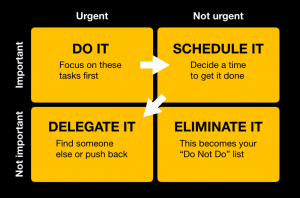It seems that there is never enough time in the day. But, since we all get the same 24 hours, why is it that some people achieve so much more with their time than others? The answer lies in good time management.
Time Management refers to making the best use of time as time is always limited. Ask yourself which activity is more important and how much time should be allocated to the task? Know which work should be done earlier and which can be done a little later. That is called Effective Time Management.
Effective time management allows individuals to assign specific time slots to activities as per their importance. It requires an important shift in focus from activities to results: being busy isn’t the same as being effective. The highest achievers manage their time exceptionally well.
Time Management plays a very important role not only in organizations but also in our personal lives.
Time management skills help you to manage your time well. By using the time-management techniques, you can improve your ability to function more effectively – even when time is tight and pressures are high.
- Planning – A fundamental part of time management is planning. Being efficient in planning out your day, meetings and how you will accomplish things will help you stick to your schedule.
- Organization – Staying organized can help you maintain a clear picture of what you need to complete and when. Being well-organized might mean maintaining an up-to-date calendar, being able to locate certain documents easily, having a tidy environment and taking detailed, diligent notes.
- Prioritization – Assessing each of your responsibilities for priority is the key to being a good time manager. There are many ways to prioritize what you need to accomplish. Prioritize the tasks as per their importance and urgency. Know the difference between important and urgent work. Alternatively, you might prioritize your tasks starting with the most time-sensitive, or a combination of both.
- Important and urgent – These are the tasks you should do first.
- Important but not urgent – Tasks you can schedule to do later.
- Not important but urgent – If possible, you may delegate these tasks.
- Not important and not urgent – You can skip tasks falling into this category.

- Goal-setting – Setting goals is the first step to becoming a good time manager. Goal-setting allows you to clearly understand your end goal and what exactly you need to prioritize to accomplish it. Setting both short and long-term goals can lead to success in your career.
- Setting Deadlines – Set deadlines for yourself and strive hard to complete tasks ahead of the deadlines. Take ownership of your work. One person who can best set the deadlines is you yourself. Ask yourself how much time needs to be devoted to a particular task and for how many days. Use a planner to mark the important dates against the set deadlines.
- Communication – Developing strong communication skills can allow you to make your plans and goals clearer to people you work with. It also allows you to delegate, which lets you focus on completing the most important, relevant tasks that align with your goals.
- Delegation – Being a good time manager means only completing work that will help you and your company accomplish goals. While this skill is most often done by managers, you can also practice delegating tasks if you are managing a project. While it can be difficult to say “no” when someone asks you to do something at work, it is important to practice having boundaries to manage your time well and ultimately accomplish your goals.
- Give a reason – Explain what other important tasks you’re doing at the moment and how taking on new ones will affect them.
- Let them prioritize – If you already have a lot of tasks on your plate, let them decide whether the task they’re asking you to do is a higher priority, or not.
- Don’t lie – Fake excuses are not a good way to deal with requests. Be open about why you’re not able to do something at the moment.
- Ask if the task may be postponed – Most of the time the initial date someone asks you to deliver a task is not it’s definite due-date. Show them that if it’s possible to schedule a new task for later, it would be possible for you to take it on.
- Spending the right time on the right activity – Develop the habit of doing the right thing at the right time. Work done at the wrong time is not of much use. Don’t waste a complete day on something which can be done in an hour or so. Also, keep some time separate for your personal calls or checking updates on Facebook or Twitter. After all human being is not a machine.
- Summarize each day- Keeping daily summaries of your work helps you to discover where you did well, and what remains to be done. At the end of each day, take a look at your list and check the tasks you’ve completed. Seeing what you’ve managed to accomplish is a great way to get motivated for the next day. If there are still unresolved tasks on your list, ask yourself why you haven’t finished them and find solutions to that.
Using these time management strategies will help you to better organize your workday and get more done. After just a few days you will notice that:
- Your productivity has improved.
- It’s easier for you to do the tasks you’ve been assigned to.
- It feels like you have more time all of a sudden.
- Work-related stress has dropped significantly.







